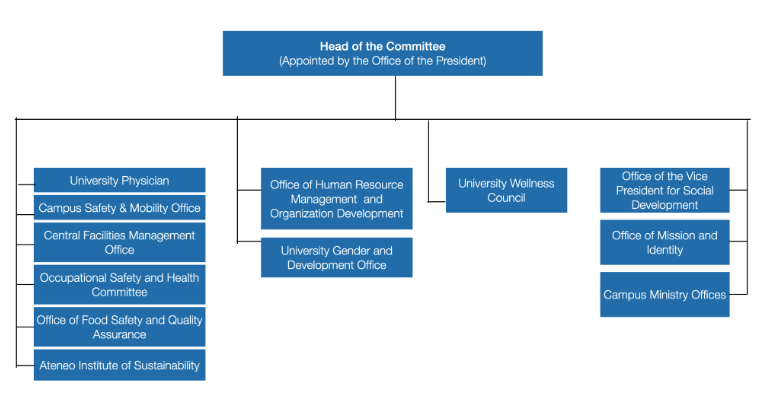University Documents, Policies, and Regulations
Policy Statement on University Health and Well-Being
Issued through University Memo U2122-039, 11 November 2021
The Ateneo de Manila University strives to achieve transformational impact in the areas of teaching and learning, whole-person formation, research, and social engagement in a way that not only preserves but also promotes the health and well-being of each and every member of the University community.
Dimensions of health and well-being in the University
Health and well-being in the University covers several dimensions, namely physical, social, mental, and spiritual well-being. These are briefly described below.
- Physical well-being. The University is committed to helping its members achieve improved physical fitness, freedom from bodily harm, absence or effective management of disease, and longevity. Raising the standards of physical health involves the effective design, construction, and maintenance of physical spaces on campus. It considers and addresses the possible hazards to physical safety of school and work practices and environment. It also requires that opportunities for physical activities, active mobility, and healthy lifestyle choices (e.g. nutritional selection of food, wellness programs and services, etc.) are provided and there is access to quality health care services whether on campus or through established partnership with a network of healthcare facilities.
- Social well-being. The University endeavors to provide a social environment that nurtures positive relationships and interaction that foster personal, professional, intellectual, and spiritual growth. It seeks to afford members of the community a social space, both physical and online, that promotes peace and harmony and freedom from random and systemic acts of bullying, sexual and other forms of harassment, discrimination, violence, and abuse.
- Mental well-being. The University aims to support its members in strengthening their ability to cope with the daily demands of life by providing responsive care through a network of mental health providers, opportunities that will allow mental and emotional health to flourish, and a conducive environment that motivates its members to realize their fullest potential.
- Spiritual well-being. The University strives to nurture a sense of purpose and meaning that allows for greater connectedness of personnel and students to their work, to others, and to nature. As a Jesuit, Catholic university, Ateneo thus creates a workplace that is more than a source of livelihood or professional growth but rather an environment where the members of its community can express and fulfill their spirit and identity.
Guiding principles
In promoting the health and well-being of each and every member of the community, the University shall be guided by the following principles:
- Whole-of-university approach. The promotion of health and well-being is the responsibility of each individual. The University is committed to build on individual efforts recognizing that the promotion of health and well-being is also determined by institutional policies, structures, and relationships, which are in turn rooted in cultural paradigms. Thus, a whole-of-university approach to health and well-being involves both broad sectoral engagements, as well as a deep discernment of the values that guide individual lifestyles.
- Integration. The promotion of health and well-being must be manifested in its effective integration in the University’s planning and operations, culture, structures, and systems. Mechanisms should be established to integrate the initiative into curriculum, formation, research, and outreach across all the units of the University.
- Non-discrimination. The promotion of health and well-being must demonstrate inclusivity. No one shall be discriminated against on the basis of sex, gender, race, ethnicity, religion, political belief, status, disability, or other personal factors or circumstances. Moreover, choices made on the basis of personal beliefs and conviction shall be respected.
- Sustainability. Efforts to promote health and well-being must be supported and carried out, so far as is reasonably practicable, through sufficient resources and appropriate measures that will assure continuity and meet the needs of the present without compromising the future. Cooperation and volunteerism are key in achieving the University’s aims for the benefit of its internal stakeholders and the larger community.
- Cura personalis. All aspects of health and well-being must be consistent with the Ignatian principle of cura personalis or care for the whole person.
Operational structure
A University Health and Well-Being Steering Committee, directly accountable to the Office of the President, will be established. It will centrally direct and coordinate the various university functionalities that contribute to well-being. The steering committee Chairperson will be appointed by the President. A diagram of the structure is provided below.
Figure 1. University Steering Committee on Health and Well-Being.

All schools, departments, and offices within the University shall comply with the policies and standards set by this committee for consistent fulfillment and realization of the University’s commitment to health and well-being.